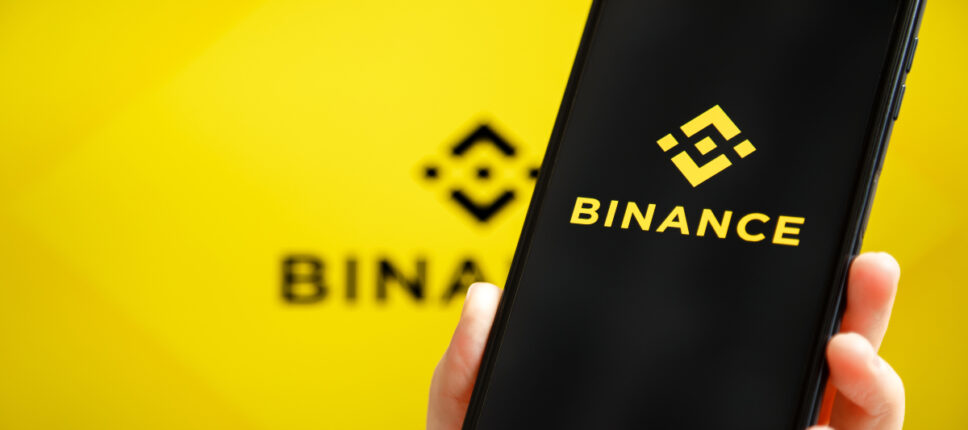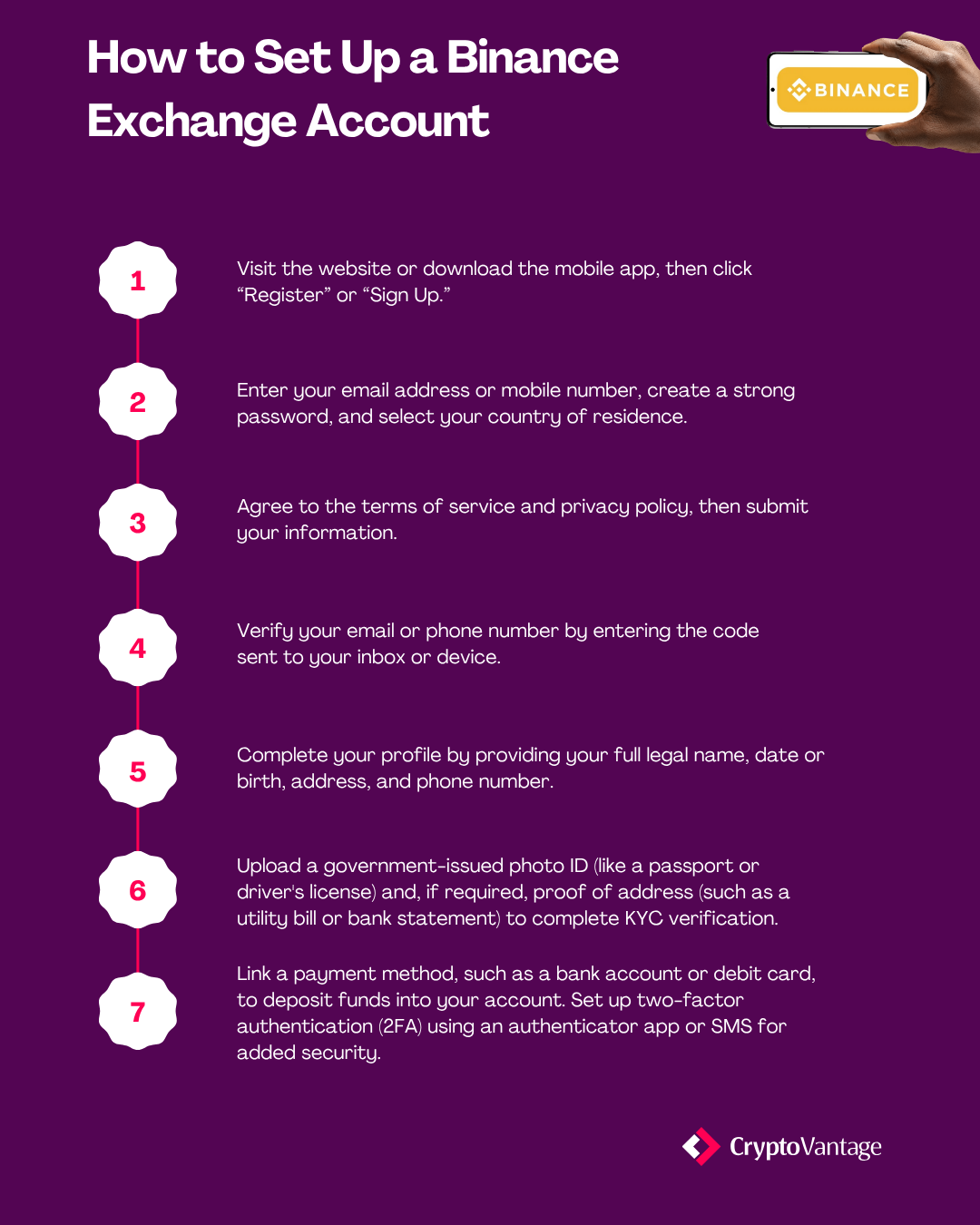- >Best Crypto Exchanges
- >Binance Review
Binance Exchange Review 2026

Pros
Straightforward sign-up process
Support for credit and debit cards
Supports 350+ cryptocurrencies for trading
Rapid transactions
Lucrative on-site staking options
Cons
Withdrawal fees vary and can be high
Exchange has been hacked in the past
Main site not available in the USA
The centralized exchange model carries security and custody risks
Supported Cryptocurrencies
350+ digital assets supported
Fiat currencies
USD, EUR, GBP, CAD, AUD, and others
Trading Volume and Liquidity
$65 billion (24-hour peak)
Number of users
280 million users
Customer support
24/7 chats, online resources
Fees
Maker/Taker fee schedule
Highlights
Binance is renowned for its compliance with global licensing and registration requirements. This is demonstrated through its localized compliance and approvals in numerous jurisdictions, including France, Australia, Italy, Spain, Bahrain, and Mexico. In 2019, Binance.US was launched to serve American users and adhere to U.S. financial regulations.
In 2023, the company committed to strengthening its Anti-Money Laundering (AML) and Know Your Customer (KYC) compliance programs. KYC procedures are now mandatory on the platform to comply with global regulations aimed at financial crime prevention.
Digital assets are stored offline in cold storage wallets, making user funds less susceptible to hacking attempts, and an emergency insurance fund is maintained to protect users from financial losses that could be caused by security breaches or system failures.
Users benefit from security features like two-factor authentication (2FA), anti-phishing code, and device management. Published proof-of-reserves allows users to verify that the exchange backs their assets.
The exchange offers advanced trading opportunities, including trading futures, options, and leveraged tokens. Several earning opportunities are available, including staking, flexible savings, and the BNB vault. Support is provided for some of the best crypto trading bots, and highly robust APIs support professional and algorithmic traders.
Fees and Costs
Fees are a critical consideration all traders must consider before trading. This is because the fees charged by an exchange will impact your potential profits.
Binance fees are highly competitive, with frequent and high-volume traders rewarded for their activity on the platform. Native BNB token holders also enjoy significant trading fee discounts.
💡 Tip: Paying fees with BNB unlocks a 25% discount on most spot trades.
Instant buy/sell fees
Users who instantly purchase crypto using credit or debit cards incur higher fees than those using the spot trading platform. The final fee varies based on the payment method chosen and the user’s geographic region.
Deposit & withdrawal fees
While crypto withdrawals are free, the exchange charges a network transaction fee. This fee is influenced by many factors, including specific cryptocurrency, blockchain network, and level of congestion on the network. Additionally, users may incur third-party charges based on their payment method.
Margin/futures fees
Our Binance exchange review found that the platform uses a tiered Maker/Taker model for both futures and margin trading fees. The fees ultimately paid by users depend on their 30-day trading volume and BNB value, with the exchange rewarding high-volume traders.
It’s important to note that margin trading requires borrowing funds. This means that the users will pay interest on the borrowed amount. This interest rate, while often minuscule, is charged hourly, and the overall value of the interest increases the longer you maintain your margin position.
Trading perpetual futures involves standard trading fees (maker/taker) and a unique charge: the funding rate.
Since perpetual contracts have no expiration date, the funding rate ensures the futures price stays close to the asset’s current market value. This rate is a periodic payment (usually every eight hours) that is exchanged between traders, not paid to the exchange. The side of the contract that is more popular pays the side that is less popular.
Hidden costs & spreads
Seasoned traders understand that the overall costs of trading crypto are determined by the costs beyond the exchanges’ maker/taker fee structure.
Non-obvious costs on the exchange can be found in spreads. Spreads are the difference between the buying and selling price, which is automatically paid when users execute a trade. These spreads are wider/pricier for lower-value trades and less expensive for higher-value trades.

Security & Regulation
Over 250 million registered users trade cryptocurrency on the Binance crypto exchange. Here are some of the measures used by the platform to achieve its status as one of the safest cryptocurrency exchanges.
Storage & custody
The majority of customer assets are held in secure, multi-signature cold storage systems. This protects customer funds from being hacked. In addition, the exchange backs customer funds through a Secure Asset Fund for Users (SAFU), which is an emergency insurance fund that was established to protect users from security breaches.
Account security
The exchange protects user accounts with several security measures. These include two-factor authentication (2FA) via an authenticator app. The platform allows users to whitelist wallet addresses, which ensures safe transfers to some of the best crypto wallets, and provides them with an anti-phishing code to help identify genuine emails.
Audits & compliance
Recently, the exchanges significantly enhanced their compliance structure to ensure alignment with global regulations. This includes publishing proof-of-reserves, enforcing mandatory KYC, and completing AML checks.
Regulatory licenses
The exchange holds numerous regulations and licenses from regulatory bodies from around the world. They operate globally in over 180 countries and do their best to comply with regulatory requirements in the countries where they operate. This includes registration in France, Australia, and Sweden. They also hold relevant regulatory licenses in Spain, Dubai, and Italy.
Past incidents & mitigation
In 2019 the platform suffered a major security breach. Hackers targeted high-value user accounts and obtained API keys, 2FA codes, and other information required to log into accounts. They then executed a single withdrawal from the exchange’s hot wallet of 7000 Bitcoin (BTC) valued at over $40 million.
It’s worth noting that no user funds were lost. The exchange covered the entire loss of the 7000 BTC using its SAFU insurance fund.
Features & Tools
The largest cryptocurrency exchange offers a vast array of features, products, and tools to take crypto trading to the next level. These tools cater to advanced users as well as beginners.
Trading features
Binance offers spot, margin, and derivatives trading, allowing users to trade hundreds of cryptocurrency assets. The exchange excels for strategic traders using specialized tools, including bots for automated trading, algorithmic trading, and copy trading. Their over-the-counter (OTC) portal is praised by institutional traders executing large transactions and using specialized services like their VIP loans.
Staking & earning
The exchange offers users various ways to earn income on their cryptocurrency holdings, including its simple earn feature, which allows them to deposit crypto into flexible or locked terms to earn variable APY.
Users stake supported proof-of-stake assets directly on the platform to earn rewards from market validation. Launchpool and Megadrop give users free, newly issued tokens from upcoming crypto projects when they lock up their BNB and other assets.
NFT marketplace & Web3 services
The platform’s dedicated NFT marketplace allows users to explore, mint, purchase, and trade digital art and collectibles. Their Web3 wallet enables users to interact with various dApps, access multiple blockchains, and perform on-chain swaps.
They offer a cryptocurrency Visa card that allows users to spend their crypto and fiat currencies anywhere Visa is accepted.
Mobile app
The mobile app is available for both Android and iOS devices, allowing users to easily switch between the Lite and Pro interfaces and access core trading and management functions while on the move.
The simplified interface is for all users needing quick, essential crypto functions. It features streamlined navigation and basic tools, making transactions easy for beginners. Pro Mode delivers the full, professional crypto management suite. It provides experienced users with advanced order types, comprehensive trading analytics, and access to the full ecosystem of investment and portfolio tools, including staking and lending.
Feature
Lite
Pro
User Interface
Simple, beginner-friendly; limited menus & features
Advanced, customizable dashboard; full menu access
Fees
Same core spot trading fees as the full app
Full fee schedule, including advanced trading, margin, futures, and more
Order Types
Market and limit orders only
Market, limit, stop-limit, OCO, trailing stop, margin & futures orders
Charting Tools
Basic price charts, minimal indicators
TradingView-powered charts, technical indicators, drawing tools, and order book views
Ideal Use Case
Quick buys/sells, portfolio checks, entry-level users
Active traders, technical analysis, and advanced portfolio management
Institutional & API tools
The platform offers OTC services and regulated futures access for institutional and high-volume traders, facilitating larger, discreet transactions. Professionals and developers can use the exchange’s API to automate trading, integrate efficient account management, and build powerful custom applications.
Supported Assets & Markets
Binance provides access to an exceptionally broad and diverse range of cryptocurrencies, tokens, and trading pairs, significantly larger than most competitors.
Cryptocurrencies & tokens
The platform supports the trading of between 350 and 600 cryptocurrencies, depending on the region. This includes popular tokens like Bitcoin, Ethereum, Ripple, and Litecoin. A large selection of emerging tokens, DeFi assets, and altcoins are available for trade. The platform’s native coin, BNB, provides users with discounts and rewards.
Fiat pairs
The exchange supports a vast number of fiat currencies and accepts numerous payment methods, including bank transfers, card payments, and P2P trading.
Major supported fiat currencies include the US dollar (USD), euro (EUR), British pound (GBP), Brazilian real (BRL), Australian dollar (AUD), and many more.
Geographic availability
The crypto trading platform is available in more than 100 countries around the world. It’s important to note the exchange set up regulated entities in the United States and Thailand to comply with the locations regulatory frameworks.
This means that users can buy crypto in the USA using the platform.
Usability & User Experience
Our Binance review found that one of their greatest strengths is their versatility, which allows users to tailor their trading to match their skill level. It balances a simplified entry point for beginner investors with the extensive, high-performance tools required by professional traders.
Desktop & web interface
The dashboard is clean and organized and offers users easy access to portfolio management, market data, and core trading areas. New users should start with the intuitive Lite mode, while experienced traders will easily navigate the Professional (Pro) interface. The pro interface features interactive charting, real-time order books, and powerful AI-powered widgets for more in-depth analysis.
Mobile app experience
The mobile application performs smoothly and offers high-speed trade execution on both iOS and Android. It allows users to seamlessly switch between the simple Lite and advanced Pro modes.
Its integration with the Web3 Wallet makes managing assets and transferring funds between the centralized exchange and decentralized Web3 space effortless. The application receives regular updates that enhance security, speed, and customization features.
Learning curve
While the depth of the platform creates a steep learning curve for those moving to Pro mode, the platform actively supports this journey through their Academy, which teaches people all they need to know about trading crypto online. It features articles, guides, and courses for all levels. The Learn & Earn program rewards users with free crypto for completing short educational lessons and quizzes.

Customer support
The exchange provides multilingual customer support through live chat, email, and a comprehensive help center. The support system uses a chatbot for fast responses to common queries, with escalation to human agents for complex issues. While the availability of 24/7 support and extensive FAQs ensures most concerns are addressed, response times may vary during high-demand periods.
Their ticketing system, knowledge base articles, and proactive incident notifications provide a mostly reliable support experience. Resolution speeds and personalized assistance can be slower compared to some competitors.
How To Set Up a Binance Exchange Account
The process of setting up a crypto exchange account is easy for the platform.

Binance Alternatives
Binance is a great choice for crypto traders who want access to a wide range of features, strong liquidity, and hundreds of supported digital assets. That said, it might not check every box for you. To see how they compare to other popular exchanges, take a look at our comparison articles.
Exchange
Ideal For
Fees & Pricing
Security Features
Regulation & Compliance
Binance
Global traders
Maker/Taker: 0.10% / 0.10%
SAFU Insurance
Licensed in multiple jurisdictions
Compliance-Focused Investors
Maker/Taker: 0.20% / 0.40%
SOC 2 Type 2 Certified
NYDFS-Regulated
Derivatives & leverage traders
Maker/Taker: 0.10%
Triple-Layer Cold Wallet system
MiCA compliant
Final Thoughts & Verdict
Binance offers just about everything you could want in a crypto platform. You get access to a huge variety of coins, low trading fees, and a ton of features. Whether you’re just starting out or already know your way around, there’s a lot to like.
I especially enjoy how easy it is to jump between simple and advanced tools and earn rewards while letting some of my coins just sit there. The platform can feel a bit overwhelming at first, but if you’re serious about crypto or just want to explore what’s out there, I think it’s definitely worth your time.
FAQs
Binance is widely regarded as a trusted cryptocurrency exchange, thanks to its robust security measures. They have faced security incidents in the past, and they responded by reimbursing affected users and improving their security protocols. As regulatory scrutiny continue, they maintain their good reputation and we belive they can be trusted.
Earning $100 a day on Binance is possible, but it depends on your trading strategy, capital, and risk tolerance. You can actively trade crypto pairs and use features like staking or Binance Earn to generate passive income. Referral programs can also help you earn. Results are not guaranteed. Research and risk management are crucial, as the crypto market can be volatile.
US citizens cannot access the global platform because of regulatory restrictions. So, if you’re in America, you can register with Binance.US, a separate platform tailored to US regulations. It offers a more limited range of cryptocurrencies and features compared to the global site, but supports spot trading, staking, and basic services for most US states. Certain states remain restricted, so you should confirm your eligibility before signing up.
Although Binance provides extensive features and a wide selection of assets, there are some disadvantages. The platform’s advanced tools can be overwhelming for beginners, and regulatory uncertainty could affect access in some regions. Customer support response times can vary, especially during busy periods, and withdrawal fees may differ based on the asset. Funds are custodial, so you are subject to centralization risks.
No, Binance does not offer traditional FOREX trading or a wide range of Contracts for Difference (CFDs). The exchange focuses on crypto-to-crypto and crypto-to-fiat trading pairs, crypto futures and options, along with various DeFi products. Certain tokens that track fiat currencies or commodities and conventional forex markets are not available.
Trust Wallet is the official non-custodial Binance mobile wallet app. It enables users to manage and store thousands of cryptocurrencies, including Ethereum-based tokens and NFTs. With Trust Wallet, you have full control of your private keys. You’ll also have access to decentralized applications (dApps) through the app, it supports in-app crypto swaps and staking, and you can make transfers to and from Binance.










